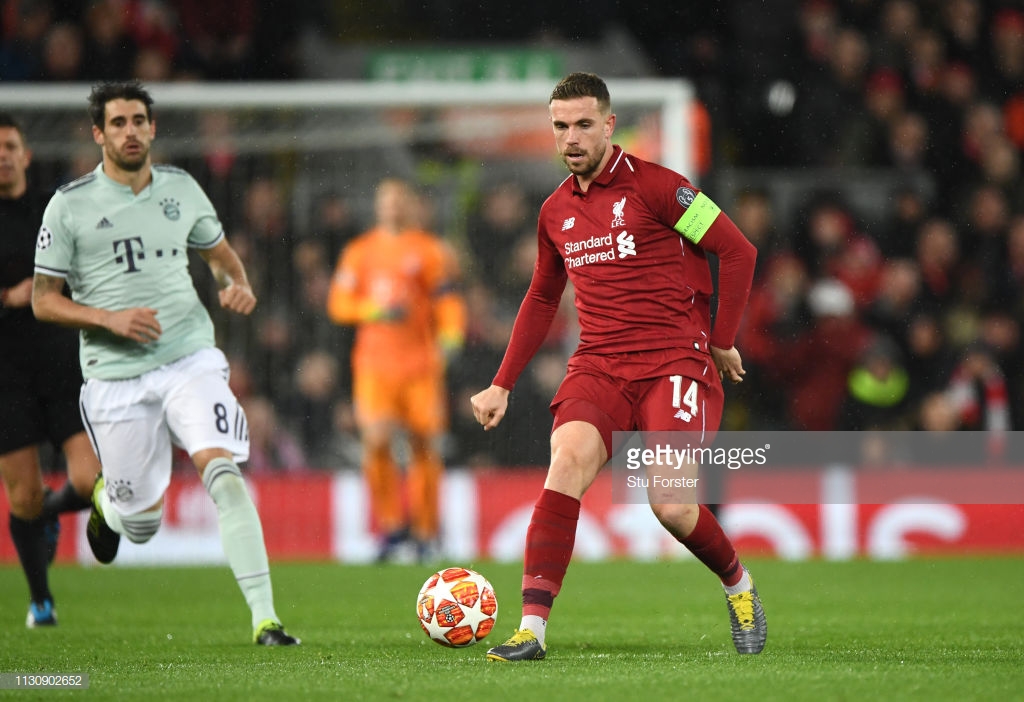Who knows? One might sit in the Allianz Arena in Munich in three weeks time and look out onto a feast of goalscoring and a match of attack after attack. However, it seems unlikely. That is not to say that when Liverpool travel to face Bayern Munich the match will mirror the first leg of this round-of-16 tie with the same levels of caution on display but the underlying sentiment will most likely continue.
Hard-fought, well-earned draw for Liverpool
Tuesday’s first leg was a slight anti-climax in terms of a spectacle, it did underwhelm at times but it was also a result that both Liverpool and Bayern will look back on rather contently. Liverpool for not conceding an away goal despite not having their three first-choice centre-backs available and Bayern for coming away from what could have been a chastening evening at Anfield unscathed and having played with relative comfort.
It was a match that suited Jordan Henderson and Georginio Wijnaldum in Liverpool’s midfield; effective in the numerous transitions that kept happening in the central areas. Perhaps that suggests why as a whole this was slightly disappointing – that Liverpool’s attack wasted good positions by often fluffing the final ball and that Fabinho and Joel Matip were rarely tested by a rather isolated Robert Lewandowski.
The fact that this was a game of the midfield doing the simple things right but often unwilling to play with the shackles completely off, also suggested that teams are playing with more caution and, dare it be said, more pragmatism. This was a performance from Liverpool that was in stark contrast to the home legs against Manchester City and Roma last season. There was pressing and frantic moments but overall there was a reluctance to fully commit.
A trend of caution developing?
There was a moment towards the end of this match when sitting watching the final exchanges along with Lyon against Barcelona on my monitor, when the question of Where have all the goals gone? crossed the mind. In terms of trying to analyse a style or approach, the scoreline is not the be all and end all. But it must be asked: Is defending making a comeback? Are the whirlwind bursts of goals a thing of the past?
Preparing for the game on Tuesday, it must be said that one anticipated that it would be rather attack-heavy – tough, tight and tense but still attack-minded. Liverpool ended up with a well-earned and hard-fought draw but there was no goal; from this Liverpool side, that was quite surprising. In fact, this was the sixth consecutive Champions League knockout match that didn’t featured a goal in the first half.
We are only in the early stages of this season’s knockout rounds but there is a feeling that sides are prioritising a strong defence above all else. Matches of goals and nearly comebacks and comebacks and comebacks from comebacks don’t seem likely to be too frequent this time around.
Goals per game is down from last season
It must be noted that this is not just a Champions League phenomenon. Liverpool have notably been more cautious in general this season, while their title duellers Manchester City have also been less inclined to go gung-ho and throw both full-backs forward at once.
It does feel a bit like a throwback. This was the type of game that Liverpool and Bayern executed when they were ruling Europe in the 1980s and quite different to recent years when if Atletico Madrid or Juventus weren’t playing, you’d struggle to find to many outstanding defensive displays.
What was apparent on Tuesday was that a large number of the players were often caught in two minds: Should I go forward or hang fire? Players who are used to hurtling forward – David Alaba and Joshua Kimmich to name just two – were almost restrained to their own half. Even in the Bayern midfield, Thiago and Javi Martinez were conscience in their approach to frustrate Liverpool rather than impose themselves with quality on the ball.
Spectacle suffered because of caution
The caution and the consequences also led to fouls and fear of mistakes proving costly, thus not allowing each other to fully enter their stride. Kimmich, for example, did venture forward once but was dispossessed by Sadio Mane, his instant reaction was to bring the Liverpool attacker down in a panic, drawing the yellow card that will keep him out of the second leg. It did affect the spectacle.
With neither wanting to overcommit and anxious about conceding possession let alone a goal, often the ball was moved forward too quickly, Liverpool rushed their chances when a cooler, calmer approach would have most definitely been more fruitful.
But then such was the cautious approach, the frantic happenings in either penalty area came as a result of trying too hard to make the few chances telling. In the end, it led to too many forced openings, not enough quality and no goals; it wasn’t the first and it won’t be the last in this season’s knockout stages.










































